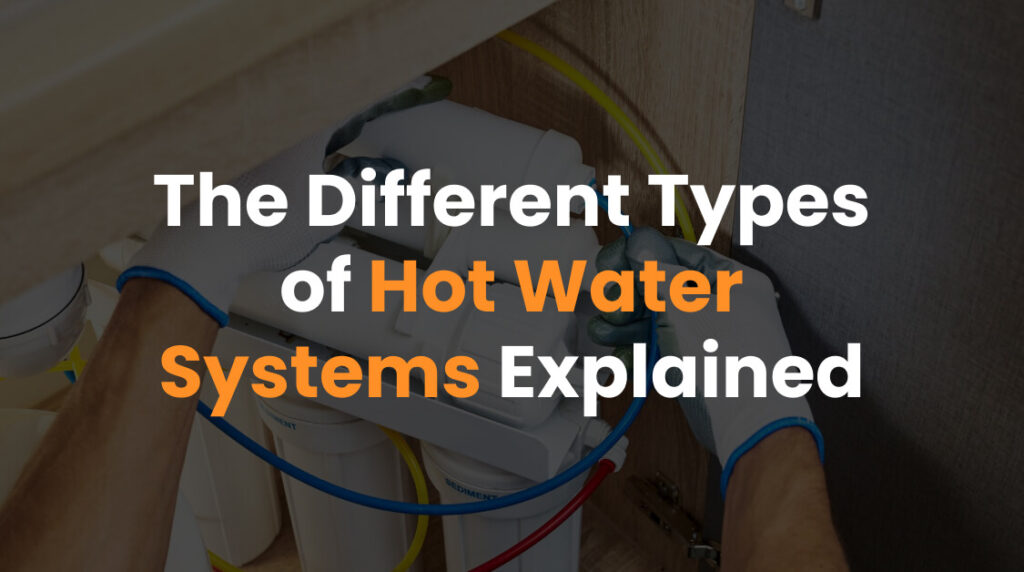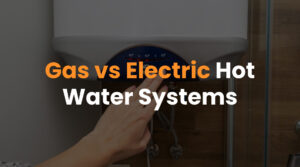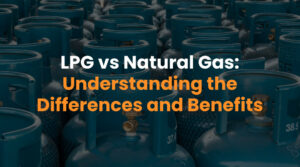Choosing the right hot water system for your home or business is crucial for ensuring efficient water heating, cost savings, and meeting your hot water needs without interruption. The market offers various types of hot water systems, each with its unique mechanisms, advantages, and considerations. Understanding the differences between these systems can help you make an informed decision, whether you’re installing a new system, upgrading an existing one, or seeking more energy-efficient solutions. This guide by Plumbwell Plumbing Services will explore the different types of hot water systems, including solar hot water systems, heat pump water heaters, gas hot water systems, electric storage systems, and continuous flow (instantaneous) systems, helping you choose the best system for your needs.
Different Types of Hot Water Systems
Electric Hot Water System
Electric hot water systems are a popular choice in many homes, offering a straightforward and reliable method for heating water. These systems function by using electrical resistance coils to heat water, which is then stored in an insulated tank, ready for use. They can be installed in various locations within a home due to their simple electrical requirements, making them versatile for different housing layouts.
Pros:
- Versatility and Ease of Installation: Electric water heaters can be easily integrated into most homes without the need for complex plumbing or gas fitting, allowing for flexibility in installation locations.
- Consistent Hot Water Supply: With a properly sized tank, households can enjoy a constant supply of hot water, ensuring that daily activities such as showers, washing dishes, and laundry can be performed without interruption.
- Lower Initial Purchase and Installation Cost: Generally, electric hot water systems are less expensive to purchase and install compared to other types of systems, offering an economical option for households focusing on upfront savings.
Cons:
- Higher Lifetime Costs: Despite their lower initial cost, electric water heaters tend to be more expensive in the long run due to the higher cost of electricity compared to gas or solar options. This can result in higher monthly energy bills.
- Dependence on Electricity: These systems rely entirely on electricity, which can be a drawback during power outages or in regions with high electricity prices. Additionally, if the electricity used is generated from fossil fuels, it can have a negative impact on the environment.
Gas Hot Water System
Gas hot water systems heat water by burning natural gas or LPG, offering a cost-effective and efficient solution for water heating. Available in both storage and continuous flow models, these systems can provide hot water on demand or store it for later use, depending on the specific needs of the household.
Pros:
- Lower Operational Costs: Natural gas is often cheaper than electricity, especially in areas where gas is readily available. This can lead to lower energy bills, making gas hot water systems a cost-effective choice over time.
- Rapid Heating Ability: Gas burns hot and heats water quickly, significantly reducing the time it takes to replenish hot water in a storage tank or to heat water on demand in continuous flow systems.
- Environmental Advantage Over Coal-Generated Electricity: For households concerned about their carbon footprint, natural gas is a cleaner alternative to electricity that is generated from coal, though it is still a fossil fuel.
Cons:
- Initial Installation Challenges: Installing a gas hot water system can be more complex and expensive if your home is not already equipped with gas lines or a venting system, potentially increasing upfront costs.
- Maintenance and Safety: Gas systems require regular maintenance to ensure safe operation. There’s also a risk of gas leaks, which necessitates the installation of detectors and a well-ventilated area for the system.
Solar Hot Water System
Solar hot water systems harness solar energy to heat water, making them an environmentally friendly and cost-effective solution over time. These systems typically consist of solar panels installed on the roof and a storage tank. They can be supplemented with electric or gas boosters to provide hot water during periods of low sunlight.
Pros:
- Sustainable and Eco-Friendly: By using renewable solar energy, these systems significantly reduce greenhouse gas emissions and reliance on fossil fuels, aligning with environmental sustainability goals.
- Long-Term Savings: While the initial setup cost is higher, solar hot water systems can drastically reduce energy bills in the long run, as the energy used for heating comes directly from the sun, a free and abundant resource.
- Government Incentives: Many regions offer rebates or incentives for the installation of solar hot water systems, helping to offset the initial investment cost.
Cons:
- High Initial Investment: The cost of purchasing and installing solar hot water systems can be significant, including the need for solar collectors and a compatible hot water tank.
- Dependence on Weather: The efficiency of solar hot water systems can be influenced by geographical location, season, and daily weather conditions, which might necessitate the use of a booster system during less sunny periods.
Instantaneous Hot Water System
Instantaneous hot water systems, also known as tankless or continuous flow water heaters, heat water directly as it flows through the unit, eliminating the need for a storage tank. These systems are highly efficient and can provide a continuous supply of hot water.
Pros:
- Space Efficiency: Without the need for a bulky storage tank, these systems are ideal for homes with limited space, allowing for installation in smaller areas like closets or under sinks.
- Energy Savings: By heating water on demand, instantaneous systems avoid the energy losses associated with keeping a tank of water hot at all times, leading to lower energy consumption and costs.
- Unlimited Hot Water: These systems can provide a continuous supply of hot water, making them perfect for families or situations where hot water is needed for extended periods.
Cons:
- Higher Upfront Costs: The initial purchase and installation cost of instantaneous hot water systems can be higher than traditional storage systems, although this is often offset by energy savings over time.
- Limited Output: Some models may struggle to supply enough hot water for simultaneous use across multiple outlets, requiring careful selection based on the household’s hot water demand.
Heat Pump Hot Water Systems
Heat pump water heaters extract heat from the surrounding air or ground to heat water, combining the efficiency of heat pump technology with water heating. These systems are an excellent option for climates where air temperatures are generally moderate to warm.
Pros:
- Exceptional Efficiency: Heat pump systems can be up to three times more energy efficient than traditional electric resistance water heaters, leading to significant energy and cost savings.
- Reduced Environmental Impact: By utilising the ambient air temperature to heat water, these systems have a lower carbon footprint compared to traditional electric or gas water heaters.
- Versatility: Heat pump water heaters can be integrated with existing water storage tanks, offering flexibility for upgrades or retrofitting.
Cons:
- Climate Sensitivity: The efficiency of heat pump water heaters can decrease in very cold environments, as they rely on extracting heat from the air, which might limit their effectiveness in colder climates.
- Higher Initial Cost: While offering significant operational savings, heat pump hot water systems typically have a higher purchase price and installation cost compared to conventional water heaters, making the initial investment larger.
Storage Hot Water Systems Vs Continuous Flow Hot Water Systems
When it comes to ensuring your home has an efficient hot water system, understanding the differences between storage water heaters and continuous flow (or instantaneous) water heating systems is crucial. These systems use various methods to heat the water, impacting energy consumption, the availability of hot water, and overall efficiency.
Storage Hot Water Systems
Storage hot water systems, whether gas or electric, heat the water before storing it in an insulated tank, ready for use. This method means that the water is heated and then kept at a constant temperature until needed, ensuring a ready supply of hot water to your home’s outlets.
Pros:
- Consistent Supply: Provides a steady and reliable hot water supply, ensuring you rarely run out of hot water, even during high-demand periods.
- Variety of Sources: Can utilise electricity, gas, or solar energy (via a PV system) to heat the water, offering flexibility in energy use and potential cost savings.
Cons:
- Energy Consumption: Because the water is continuously kept hot, these systems can consume more energy, especially if the tank is not well insulated or the system is older.
- Space Requirements: The need for a large tank to store hot water means these systems require significant space, which can be a drawback in smaller homes or apartments.
Continuous Flow Hot Water Systems
Continuous flow systems, also known as instantaneous or tankless water heaters, only heat water as it is needed. When a hot water tap is turned on, cold water flows through the unit, where it is heated by either gas or electric elements before being delivered to the outlet.
Pros:
- Energy Efficiency: These systems are generally more energy-efficient than storage systems, as water is only heated on demand, eliminating the energy loss associated with keeping a tank of water hot.
- Space-Saving: Without the need for a large storage tank, continuous flow systems are compact and can be mounted on a wall, freeing up valuable floor space in your home.
Cons:
- Limited Flow Rate: The flow rate of hot water can be limited, potentially making it challenging to supply multiple outlets simultaneously without a drop in temperature.
- Higher Initial Cost: While offering savings on energy bills, the upfront cost for an electric instantaneous water heater or gas model can be higher than for a traditional storage system.
Choosing the Best Hot Water Heater System For Your Needs
Choosing the best hot water heater system for your home involves a thorough assessment of your household’s hot water needs, energy efficiency goals, space constraints, and budget. Each type of hot water system—be it gas, electric, solar, or heat pump—comes with its own set of advantages and considerations. Here’s a guide to help you navigate through your options and make an informed decision.
Assess Your Hot Water Needs
The first step in selecting the right hot water system is to evaluate how much hot water your household uses. Consider the number of people in your home, your peak water usage times, and the simultaneous demand for hot water in different outlets. Larger families or homes with high simultaneous hot water use might benefit more from a storage water heater system, which ensures a ready supply of hot water. In contrast, smaller households with less simultaneous demand might find an instantaneous (continuous flow) system more appropriate and energy-efficient.
Consider Energy Efficiency and Environmental Impact
Energy efficiency is a crucial factor for many homeowners, not only for the potential savings on energy bills but also for reducing environmental impact. Here’s how different systems stack up:
- Electric Instantaneous Water Heaters: These are efficient in that they only heat water on demand, but their overall efficiency and environmental impact depend on the source of your electricity. If your electricity comes from renewable sources, this could be a more eco-friendly option.
- Gas Hot Water Systems: Generally more energy-efficient than their electric counterparts and can be cheaper to run, especially if natural gas is readily available in your area. However, they do rely on fossil fuels, which has environmental implications.
- Solar Water Heater Systems: utilise renewable energy, making them the most environmentally friendly option. They can significantly reduce energy bills, though the initial installation cost is higher. Consider adding a solar PV system to maximise the use of solar energy in your home.
- Heat Pump Water Systems: Highly efficient as they use air to heat water, these systems work well in moderate to warm climates and can offer significant energy savings over traditional electric water heaters.
Space Considerations
The amount of available space you have can also influence your decision:
- Storage Water Heaters require enough space for the tank, which might be an issue in smaller homes or apartments.
- Instantaneous Systems are compact and can be mounted on a wall, saving valuable floor space.
Budget Constraints
Your budget will play a significant role in your decision:
- Initial Costs vs. Long-term Savings: While some systems may be more expensive to purchase and install (like solar water heaters and heat pump systems), they can offer greater energy savings in the long run.
- Operational Costs: Consider the ongoing operational costs of each system. Gas and solar typically offer lower operating costs compared to electric storage water heaters.
Conclusion
In choosing the best hot water system for your needs, weigh the pros and cons of each type against your household’s specific requirements. It’s also wise to consult with a professional who can offer insights based on your local climate, available energy sources, and the latest energy-efficient models. Remember, the right hot water system can provide not only comfort and convenience but also significant savings and a lower environmental footprint over its lifetime.
Frequently Asked Questions
What’s the difference between a storage water heater and an instantaneous water heater?
A storage water heater heats water and stores it in an insulated tank for when it’s needed, which can lead to energy losses due to standby heat. An instantaneous water heater, also known as a tankless or continuous flow heater, heats water directly as it flows through the device without storing it, providing hot water on demand and reducing energy losses.
How do I determine the right size hot water system for my home?
The right size for your hot water system depends on the number of occupants in your home and your peak water usage. For storage systems, a general rule is about 30-40 litres per person per day. For instantaneous systems, it’s more about the flow rate (litres per minute) and ensuring it can handle your peak demand. Consulting with a professional can help you accurately assess your needs.
Are solar hot water systems worth the investment?
Solar hot water systems have higher initial costs but can significantly reduce your energy bills and environmental impact over time. They’re most cost-effective in regions with abundant sunshine but typically require a backup system for cloudy days. Government rebates and incentives can also offset the initial investment, making them a worthwhile consideration for many homeowners.
Can I switch from an electric to a gas hot water system?
Yes, you can switch from an electric to a gas hot water system if natural gas is available in your area. This may require installing gas lines and possibly a venting system for a gas storage water heater, so it’s important to consider the installation costs. However, gas systems often have lower operating costs than electric ones, which can lead to savings over time.
How long do hot water systems typically last?
The lifespan of a hot water system varies by type and how well it’s maintained. On average, storage water heaters last 10-15 years, while instantaneous water heaters can last up to 20 years. Solar water heater systems can also last 20 years or more. Regular maintenance can extend the life of your system and ensure it runs efficiently.
What maintenance does my hot water system need?
Maintenance requirements vary by type of system. Storage systems should be inspected annually for sediment build-up, corrosion, and leaks. Instantaneous systems generally require less maintenance but should still be checked for scale build-up and proper operation. Solar systems need checks on the solar panels and the system’s antifreeze concentration if applicable. It’s best to consult your system’s manual and a professional for specific maintenance tasks.








